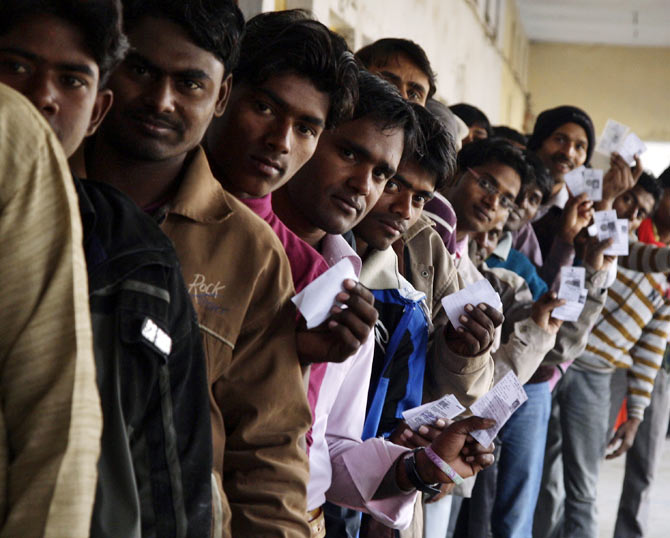 | « Back to article | Print this article |
Budget 2014: Tax woes of multi-national cos likely to end
A higher payment to the MNC parent helps an Indian company show lower income and save on tax. But the exchequer takes a hit, notes Vrishti Beniwal
In a move aimed at avoiding litigation in thousands of transfer-pricing cases, the finance ministry is likely to allow in the Union Budget rollback of advance-pricing agreements to past years.
This is seen as good news for large multinational companies like Shell, Vodafone and Microsoft, which have received draft tax orders in recent years for purportedly suppressing incomes, as these cases could be resolved under APAs.
Introduced in June 2012, APA rules are meant to provide certainty to taxpayers by specifying in advance the arm’s-length pricing in cross-border transactions among related parties for the next five years.
At present, these apply only to future transactions, so a taxpayer has to file an application before the beginning of a financial year in which it intends to make a transaction.
Click NEXT to read further. . .
Budget 2014: Tax woes of multi-national cos likely to end
The ministry is now considering giving taxpayers the option to include under APAs their unresolved past cases where assessments have not been closed.
However, the option is likely to be provided only if business and economic conditions for the APA years and earlier years are consistent.
“We are proposing rollback of APAs to past years, provided the facts and circumstances of the case remain the same,” said a ministry official who did not wish to be named.
Tax authorities added Rs 2 lakh crore (Rs 2 trillin) to the income of Indian arms of MNCs in the past five years, asking them to pay taxes on the adjusted income.
At the rate of 30 per cent, this translates into a tax demand of Rs 60,000 crore (Rs 600 billion).
Most taxpayers have challenged such tax notices.
Click NEXT to read further. . .
Budget 2014: Tax woes of multi-national cos likely to end
“There are about 6,000 cases where assessments have not yet been finalised.
“We were resisting a rollback earlier but after a widespread demand from industry, we are now open to reviewing it,” said another official who refused to be identified.
There are two views on whether a rollback should apply only to cases where assessments are not final or also to cases under litigation.
Experts say the government could unlock the amount held up in disputes by applying the agreed outcome of APA with a company to its income for earlier years.
“The dispute is more on the method, and not just on the number.
“If the government has agreed to a particular method (to calculate profit margins) for the next five years, it will be very difficult for tax authorities to argue against that method in courts.
Click NEXT to read further. . .
Budget 2014: Tax woes of multi-national cos likely to end
“If rollback of APAs is formalised, you don’t have to fight it out in court.
“You can settle it through some conciliation process,” said PwC Partner Rahul Mitra.
Officials also said the agreed profit margin for levying tax in future could not be the benchmark while applying APA provisions to past years but the approach would remain the same.
For instance, if the cost-plus method has been agreed upon under an APA, the same method will be applied to previous years.
“APA is a negotiated position.
“So you cannot translate the same thing back. Only broad parameters and methodology can be rolled back, not the margins,” added another official.
The methods like ‘comparable uncontrolled prices’, ‘resale price’, ‘profit-split’ and ‘transactional net margin’ are some other approaches used in transfer pricing to determine arm’s-length pricing.
Click NEXT to read further. . .
Budget 2014: Tax woes of multi-national cos likely to end
The agreed price is not questioned by tax authorities and they conduct only a limited audit of a company.
On March 31, the government had signed the first batch of APAs with five multinationals in the field of pharmaceuticals, telecom, exploration and financial services.
The pacts included a range of international transactions like interest payments, corporate guarantees, non-binding investment advisory services and contract manufacturing.
During consultations before filing of APA applications, taxpayers are given the opportunity to share their expectations from the APA process and the APA team shares a broader understanding of the coming APA procedure.
After receiving the application, the APA team works towards establishing the appropriate economic analysis of the covered international transactions.
This involves a site visit and physical verification of the applicant’s business.
Click NEXT to read further. . .
Budget 2014: Tax woes of multi-national cos likely to end
Conflict resolution
What are APAs?
Agreements between taxpayers and the tax authority on the methodology to be used for computation of arm’s-length pricing of transactions among group companies
Why are these needed?
Tax officers often question pricing of transactions among related parties.
This leads to disputes.
APAs give certainty that income declared using the agreed approach won’t be questioned
Why do firms suppress income?
A higher payment to the MNC parent helps an Indian company show lower income and save on tax. But the exchequer takes a hit.
Click NEXT to read further. . .
Budget 2014: Tax woes of multi-national cos likely to end
How will A rollback help?
If a company filing for an APA for the next five years is allowed to use the same approach for calculating profit margins of past five years, many ongoing disputes will be resolved
Who might benefit?
Vodafone, Shell, Microsoft, IBM, Maruti, Gillette, Bharti Airtel, Essar, Standard Chartered, HSBC Securities & Capital Markets, Havells and Nokia
How much would be adjusted?
Rs 59,000 crore (Rs 590 billion) in assessment year 2013-14, Rs 70,000 crore (Rs 700 billion) in 2012-13, Rs 44,500 crore (Rs 445 billion) in 2011-12, Rs 23,000 crore (Rs 230 billion) in 2010-11 and Rs 11,000 crore (Rs 110 billion) in 2009-10.







